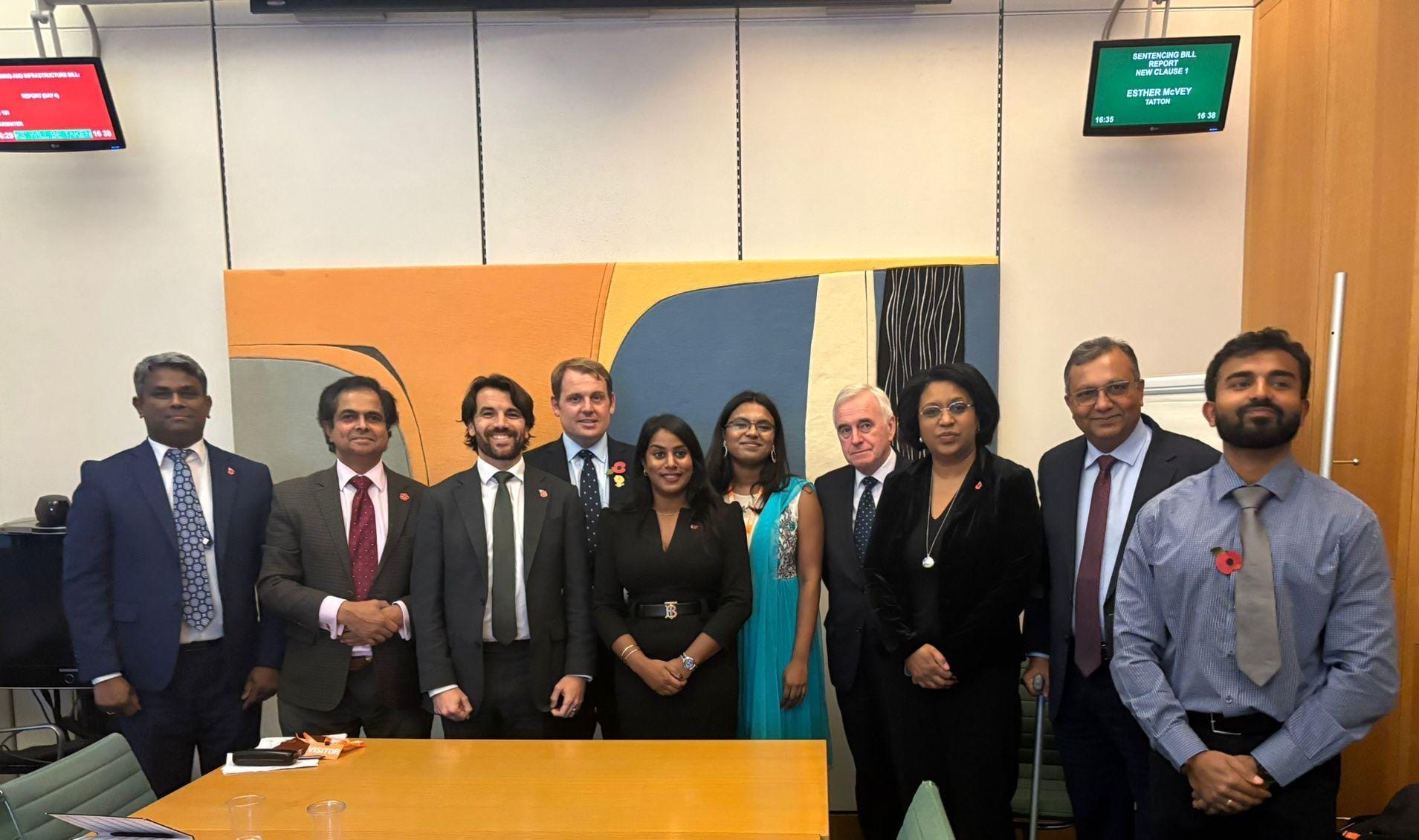News
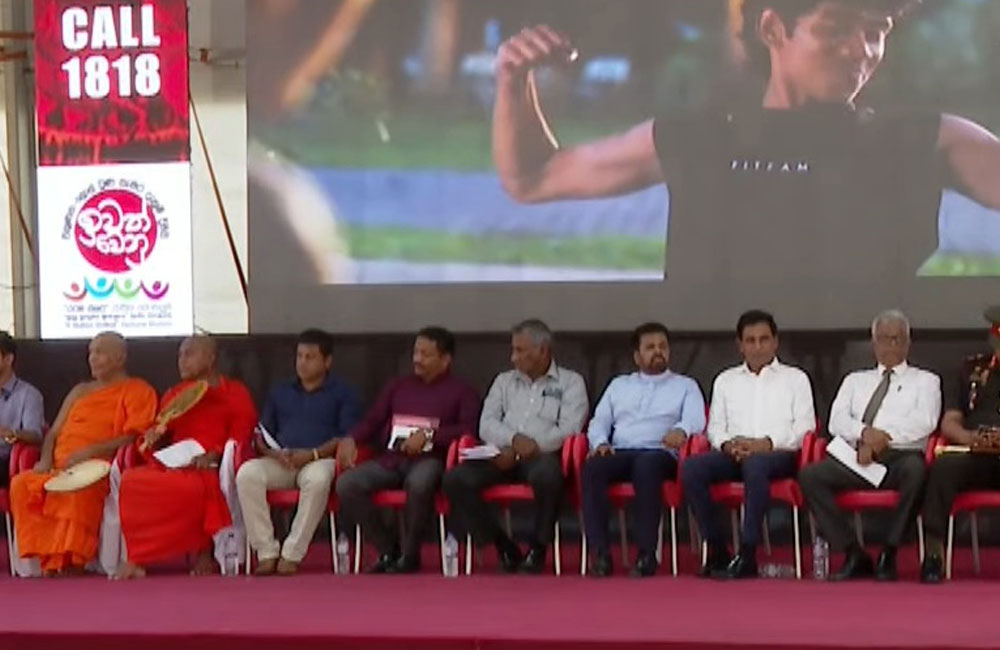
Southern Province Launches ‘A Nation United’ Anti-Drug Campaign in Tangalle
President Anura Kumara Dissanayake arrived in Tangalle this afternoon to launch the Southern Provincial Programme of the “A Nation United” National Mission, the government’s flagship initiative aimed at eliminating the drug menace in Sri Lanka.
The provincial launch is currently underway at the Tangalle Public Stadium under the President’s patronage.
Minister of Public Security Ananda Wijepala stated that this programme marks the second phase of the government’s islandwide anti-drug campaign, designed to eradicate the spread of dangerous narcotics that have grown into a national crisis.
The “A Nation United” National Mission was first inaugurated on October 30 at the Sugathadasa Stadium in Colombo, also under the patronage of President Dissanayake.

Rise in Smoking Among Schoolchildren Alarming, Health Experts Warn
Smoking among school-aged children is on the rise, according to Specialist Respiratory Physician Dr. Duminda Yasaratne of the Peradeniya Teaching Hospital.He revealed that many students first experiment with cigarettes around the ages of 14 and 15.
Speaking at a media briefing organized by the Health Promotion Bureau, Dr. Yasaratne emphasized that smoking at such an early age significantly increases the risk of developing serious lung-related diseases.
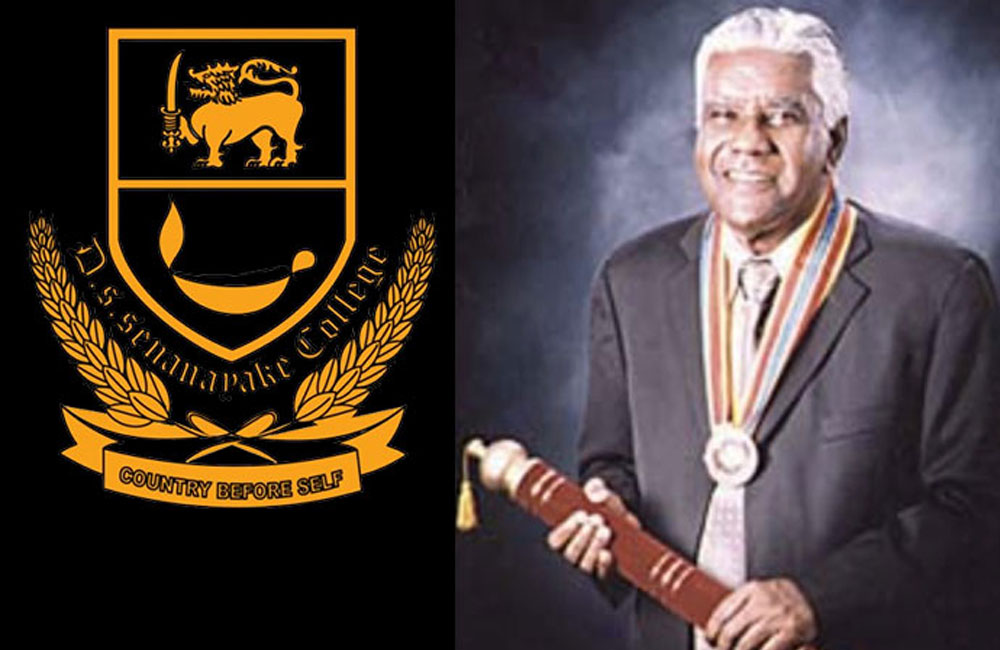
On loving memory of father of Golden Sons; R.I.T. Alles Sir
The 12th Commemoration Ceremony of the founder of our alma mater: D.S. Senanayake College is scheduled to come to light on the 27th of November 2025 at the college premises with our pound alumni Senanayakian Aravinda de Silva ayya, a former member of the National Cricket Team of Sri Lanka gracing the occasion.
Seeing the worldly light on 3rd October 1932 in Galle, Sir Ralph Ignatius Thomas Alles pursued his school education in St. Aloysius College in Galle and St. Anthony's College in Matara. Having started his career as a school teacher, he rendered his service in Royal College, Colombo for many years. Following the invitation of the education minister Hon. I.M.R.A. Iriyagolla and the principal of Royal College back then, he assumed his duties as the principal of the newly established D.S. Senanayake Junior School. Continuing his tremendous service, words cannot explain the efforts he made to enshrine D.S. Senanayake College, Colombo 7 in the education field in the country. Without stopping there, he continued serve the education system in Sri Lanka by establishing Gateway College.
That great gentleman whose name is forever remembered in the education genealogy in Sri Lanka passed away on 28th November 2013, leaving his legacy for generations to be proud of and honour.

Inland Revenue Department Records Highest-Ever Tax Collection in 2025
The Inland Revenue Department has announced that it has reached the highest tax revenue milestone in its history for the year 2025.
As of November 17, the department has collected an estimated Rs. 2,002 billion in total revenue, marking an unprecedented achievement.
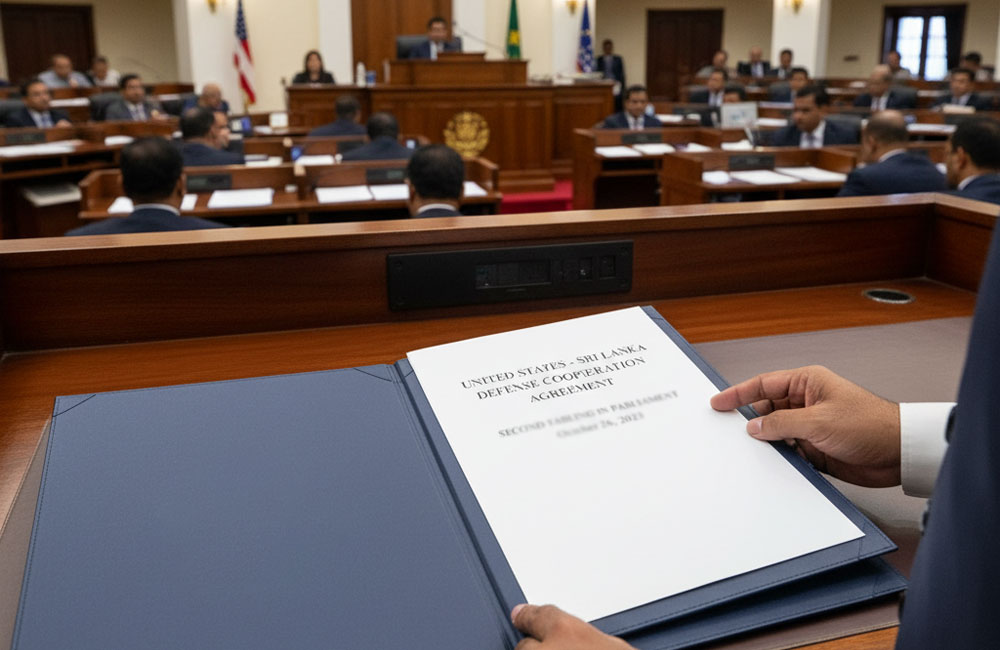
US–Sri Lanka defense agreement tabled in Parliament for the second time
The defence agreement signed between Sri Lanka and the United States will be tabled in Parliament for the second time today (20), the Deputy Minister of Defence, Major General Aruna Jayasekara (Retd) stated.
The Deputy Minister made this statement while expressing his views in Parliament.
Earlier today, Parliamentarian Dayasiri Jayasekara stated that although it was previously claimed that the agreement had been tabled, only a Sinhala-language version of the document had been presented to Parliament.
MP Jayasekara claimed that the agreement had not been officially tabled in Parliament.
Responding to this, the Deputy Minister of Defence said that the agreement had in fact been tabled earlier during the third reading debate of the Defence Ministry and that he is tabling it once again today.
In a bid to enhance bilateral defence cooperation, the United States and Sri Lanka signed a Memorandum of Understanding (MOU) on November 14 at the Ministry of Defence.
US Ambassador Julie Chung and Brigadier General Trenton Gibson, Adjutant General of the Montana National Guard signed the agreement on behalf of the U.S. Government, while the Secretary of Defence Air Vice Marshal Sampath Thuyacontha (Retd) signed on behalf of the Government of Sri Lanka.
The agreement formalises collaboration between the Montana National Guard, U.S. Coast Guard District 13, and the Sri Lanka Armed Forces under the U.S. Department of Defence’s State Partnership Program (SPP), the Defence Ministry said in a statement.
Speaking after signing the agreement, the Deputy Minister, Major General Jayasekara (Retd), underscored the significance of the MOU, stating that it represents a pivotal milestone in the enduring defence partnership between Sri Lanka and the United States.
He said, “this landmark agreement underscores our shared strategic interests and mutual commitment, paving the way for enhanced collaboration in capacity building, joint training, humanitarian assistance, disaster response, cyber defence, peacekeeping, CBRN response, and leadership development. We deeply appreciate the unwavering friendship, solidarity, and generosity of the United States and look forward to further strengthening this vital partnership.”
Meanwhile, U.S. Ambassador Julie Chung also underscored the importance of the US–Sri Lanka defence cooperation in her remarks and emphasized the deep and enduring friendship between the two nations, highlighting the significance of continued defence cooperation and mutual understanding. She acknowledged the longstanding partnership built on shared values, expressing confidence that the renewed commitments would allow shared training and learning opportunities.
With this MOU, Sri Lanka has formally joined the global network of 115 nations partnered with U.S. state National Guards under the State Partnership Program (SPP). The first series of joint activities under the MOU is planned to be held in 2026 and will focus on disaster response, maritime domain awareness, and professional military education. The partnership will enhance interoperability through joint training, maritime cooperation to counter trafficking and illicit migration, crisis response and humanitarian assistance, aviation operations, and strengthened military - civilian disaster preparedness, the Defence Ministry noted.
( Source : adaderana.lk)
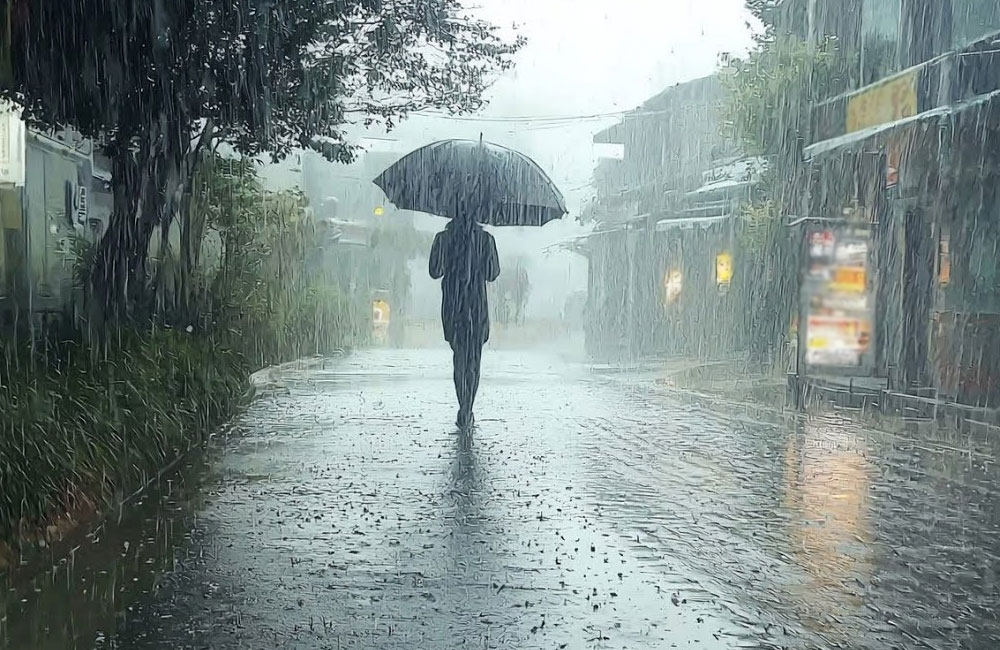
Showers Expected Across Most Provinces After 1 PM Today
Several spells of showers are expected in the Northern and North-Central Provinces, as well as in the Trincomalee District today (20), the Department of Meteorology announced.Showers or thundershowers are also likely in many other parts of the island after 1.00 p.m.
Misty conditions may prevail in parts of the Sabaragamuwa, Central, Uva, Western, and Southern Provinces during the early morning hours.
Meanwhile, the Department of Meteorology warns that a low-pressure area is likely to develop over the southeast Bay of Bengal on Saturday (22). This system could further intensify and move closer to Sri Lanka’s northern coast.
The public is advised to stay alert to upcoming weather updates and advisories issued by the Meteorology Department.

National Audit Exposes Massive Waste Undermining Sri Lanka’s Livestock Sector
Sri Lanka’s already-fragile animal husbandry sector has been dealt another blow, with the Auditor General’s latest report uncovering a series of costly missteps, failed investments and systemic weaknesses inside the Department of Animal Production and Health (DAPH).
The audit, covering the year ending December 31, 2024, reveals that more than Rs. 200 million in public funds has been locked up in collapsed breeding projects, oversized equipment purchases and chronic underutilisation of budget allocations raising serious questions about the country’s livestock development strategy.
At the heart of the audit is the disastrous Boer goat breeding project, launched in 2019 to introduce high-quality breeder goats from Australia. The government invested Rs. 37.3 million to import 100 animals, with a five-year plan to distribute 250 improved goats to farming communities. Instead, the project imploded. An outbreak of Caprine Arthritis Encephalitis (CAE)an incurable viral disease infected the herd during quarantine, crippling breeding operations.
Despite spending an additional Rs. 75.3 million on maintenance and disease management, the DAPH failed to salvage the initiative. By the end of 2024, distribution had been suspended entirely, and 141 diseased goats remained at the Imbulandanda breeding centre.
A special committee recommended culling the infected herd in January 2024, but the department failed to act for more than a year continuing to spend public money on a hopelessly compromised stock. The project’s total loss now stands at Rs. 112.6 million, the audit confirms.
Agriculture economists warn that such failures have far-reaching consequences for farmers who depend on improved breeding stock to increase meat and milk yields. With local goat milk production growing only marginally over the past decade and demand rising sharply, the collapse of a flagship breeding initiative further widens the gap between national livestock potential and output. Industry analysts also note that Sri Lanka imports over 60% of its annual requirement of goat meat, underscoring the economic cost of failed domestic breeding programmes.
The audit also exposed troubling procurement decisions in the veterinary health sector. A Rs. 96.5 million high-capacity bioreactor purchased in 2022 for vaccine production sits under-utilised due to a dramatic mismatch between output capacity and national demand.
Although the machine can produce up to 1.2 million doses, the country requires only about 300,000 doses under the relevant disease-control programme. The DAPH disputes the output figures, asserting a maximum capacity of 500,000 doses, but auditors argue that the purchase still reflects poor planning and weak demand assessment.
This misalignment comes on top of earlier inefficiencies. Between 2018 and 2020, Sri Lanka spent Rs. 89.3 million on vaccine imports costs that could have been avoided with more efficient disease-control strategies adopted sooner, the report states.
Further compounding the issue is chronic underutilisation of financial allocations, with Rs. 242.6 millionor 15% of the department’s total provision left unused in 2024. Experts say such budget lapses indicate institutional paralysis at a time when the livestock sector urgently needs investment in genetics, disease control, pasture development and farmer training.
The Auditor General’s findings paint a stark picture: a sector burdened by poor planning, delayed decision-making, avoidable waste and structural weaknesses. At a time when livestock is critical for rural incomes, nutrition and import substitution, and these failures threaten to further undermine Sri Lanka’s food-security goals


Commercial Bank first to launch Google Pay in Sri Lanka
Commercial Bank of Ceylon PLC is making history as the first bank in the country to collaborate with Google and Visa, a global leader in digital payments, to enable Google Pay for its card holders as part of the Google Wallet launch.
The Bank said that this is a defining moment for Sri Lanka's financial landscape, setting a new standard for secure and convenient digital transactions.
Commercial Bank is the only bank in the Sri Lankan market to enable Google Pay for its Visa cardholders, giving its customers a first-mover advantage with this world-class mobile payment solution. This collaboration seamlessly integrates Visa's trusted global network and advanced tokenization technology, Google's secure and intuitive interface, with Commercial Bank’s robust digital banking ecosystem.
Visa debit and credit cardholders of Commercial Bank can now effortlessly add their cards to Google Wallet, authenticate via a one-time password (OTP) or verification through call center and use their Android smartphones to make secure, contactless payments with a simple tap at any contactless-enabled Point-of-Sale (POS) terminal, anywhere Visa is accepted, locally and globally. Cardholders will no longer need to carry physical cards or cash, and can tap and pay using their NFC enabled Android smartphones - driving a secure and easy payment experience
Commercial Bank has strategically collaborated with third-party service provider IDEMIA for tokenization, leveraging Visa's Token Service (VTS). Tokenization secures every transaction by replacing the actual 16-digit card number with a unique digital token, ensuring the user's sensitive data is never shared with merchants or stored on the device. Furthermore, Commercial Bank used payment infrastructure of Euronet, the bank's card switch vendor, to launch this product which guaranteeing reliable and secure transaction processing.
Mr. Sanath Manatunge, Managing Director/CEO of Commercial Bank, said, “Partnering with Visa and Google marks a significant milestone in our ongoing commitment to elevate digital payment experiences for customers. As the largest private sector bank in Sri Lanka, this collaboration further strengthens our ability to deliver seamless, secure, and contactless transactions anywhere, anytime. By embracing global innovations such as tokenization, Commercial Bank continues to lead the way in digital banking excellence and plays a defining role in shaping Sri Lanka's cashless future. This partnership not only enhances security and convenience for millions of customers but also accelerates the country's transition toward a more technologically enabled financial ecosystem. It reflects the Bank's long-term strategy to bring world-class digital solutions to Sri Lankan consumers and businesses.”
Avanthi Colombage, Country Manager, Sri Lanka and Maldives, Visa, highlighting the collective impact, said, “Visa is pleased to collaborate with Commercial Bank of Ceylon and Google to bring the transformative payment experience of Google Pay to Sri Lanka. This launch marks a defining moment for Sri Lanka's payments landscape, empowering people across the country to enjoy a faster, more convenient, and secure payment experience – all with just a smartphone. Visa's trusted global network and advanced tokenization technology, with Google's secure, intuitive interface and Commercial Bank's strong local presence and robust ecosystem, is set to deliver more than just another payment option: we are shaping the next chapter of digital payments – one that enables digital security and trust, convenience, and interoperability at an unprecedented scale for millions of Sri Lankans.”
The initial availability will focus on select card ranges as part of a phased rollout. Commercial Bank of Ceylon is Sri Lanka's largest private sector bank and a leader in digital innovation, having been recognized as the 'Best Mobile Banking App' in Sri Lanka by Global Finance. The Bank is committed to leveraging tokenization and next-generation payment technologies to strengthen consumer trust and accelerate, digital adoption.
( Source : dailymirror.lk)
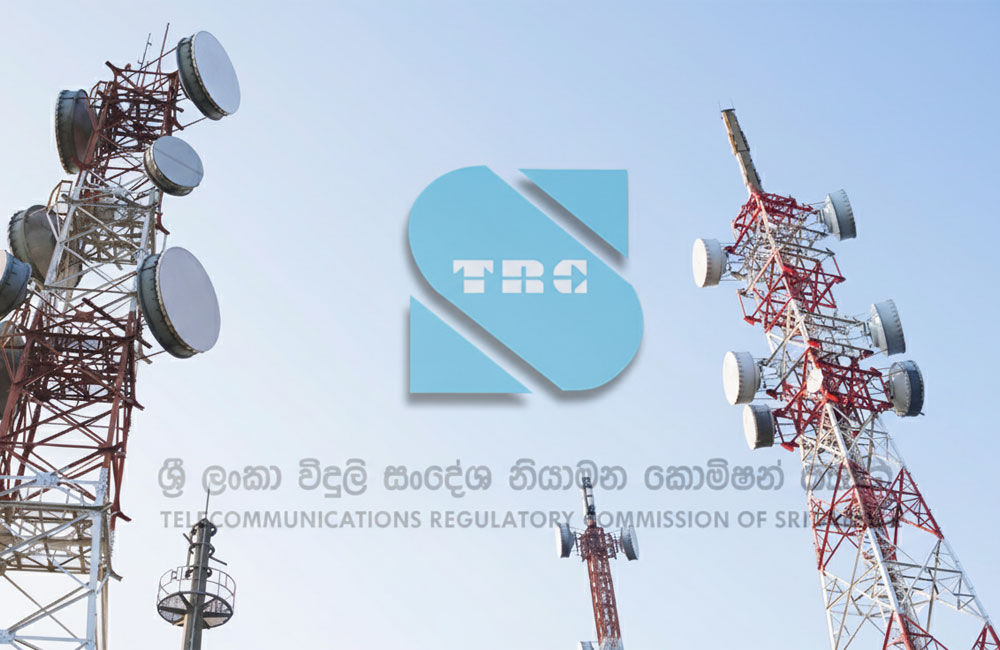
Telecom Levy Collapse Raises Fears of Widening Digital Divide
Sri Lanka’s national effort to improve connectivity in rural and underserved regions is facing a serious setback as revenue from the Telecommunications Development Charge (TDC) continues to shrink sharply, raising concerns about long-term digital infrastructure expansion and economic inclusion.
The decline was disclosed by Telecommunications Regulatory Commission of Sri Lanka (TRCSL) Director, Air vice Marshal Bandula Herath, during a briefing to the Committee on Public Finance (COPF).
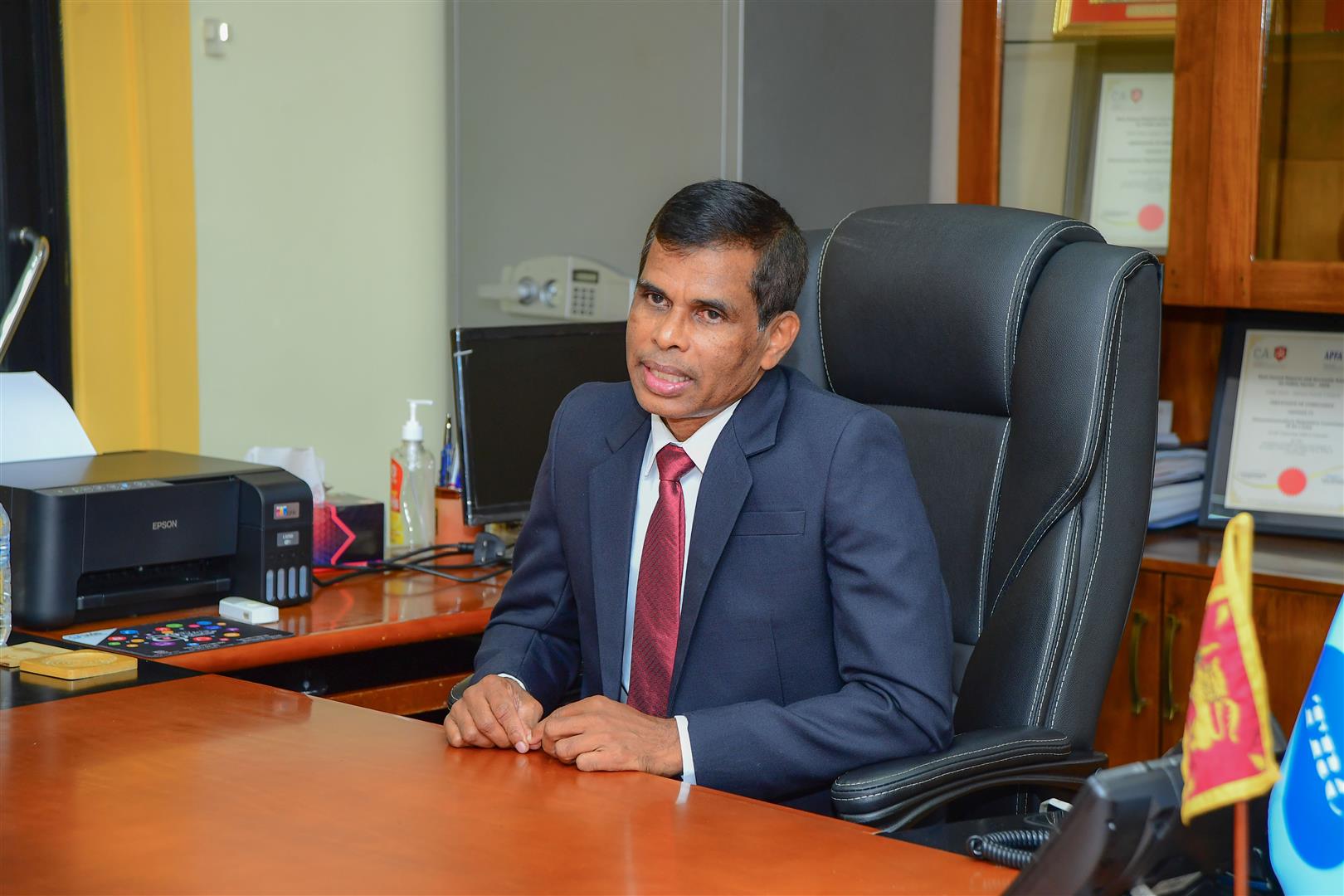 (TRCSL) Director, Air vice Marshal Bandula Herath
(TRCSL) Director, Air vice Marshal Bandula Herath
Herath noted that the TDC traditionally funded through levies on international call charges is now generating significantly less revenue as Sri Lankans increasingly rely on internet-based platforms for communication.
“Revenues from international calls have dropped because data is now the primary mode of communication,” he said, explaining that the fall in collections threatens the sustainability of the Universal Service Fund (USF), which finances connectivity in areas that private operators deem unprofitable.
The TDC was designed as a corrective mechanism to ensure that telecommunications development reached villages, remote regions and economically marginalised communities. Operators typically avoid these regions because of low returns.
To bridge this gap, the TRCSL provides co-funding for towers and network expansion projects, historically covering 50% of tower construction costs. This subsidy was increased to 75% in 2024, reflecting both the urgency of rural digital expansion and the diminishing private-sector appetite to invest.
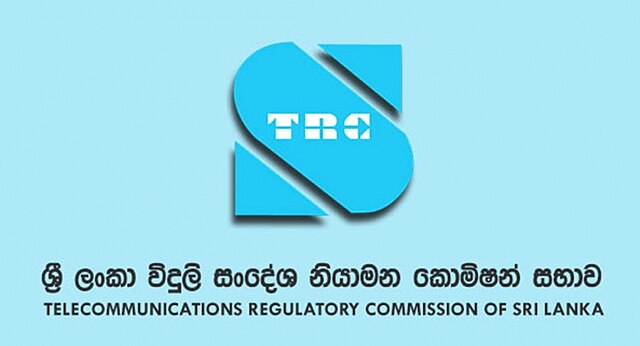 TRCSL
TRCSL
However, as the levy pool shrinks, concerns are emerging over whether the TRCSL can sustain this higher level of support. Over the past two years, the fund has financed 79 towers with an allocation of Rs. 1.3 billion, but officials warn that future investments may be constrained unless alternative revenue sources are identified.
Digital-economy analysts argue that the decline in TDC revenue exposes deeper structural vulnerabilities within Sri Lanka’s telecom ecosystem. With digital-service adoption accelerating nationwide, they argue that policy frameworks must evolve to reflect changing communication behaviours.
Continuing to rely on international call traffic now a diminishing revenue base risks widening the digital divide at a time when rural households, students and small businesses are increasingly dependent on connectivity for education, health access, market information and online services.
The economic implications are far-reaching: weaker digital infrastructure slows rural entrepreneurship, depresses productivity, reduces access to e-government services and hampers the country’s broader digital-transformation agenda. The issue is particularly urgent as Sri Lanka is pushing for digital-economy growth, e-commerce expansion and technology-enabled public services.
In response to the crisis, President Anura Kumara Dissanayake, in his role as Minister of the Digital Economy, has proposed allocating Rs. 17.5 billion over the next five years to expand telecommunications coverage in underserved areas using the USF. While the proposal signals policy commitment, experts question whether heavy reliance on the TDC without modernising its revenue model can sustain such an ambitious programme.
As Sri Lanka’s reliance on data-driven communication continues to surge, the country faces a pivotal decision: either reform the funding model for digital-infrastructure expansion or risk leaving its rural population disconnected from the opportunities of a modern digital economy.
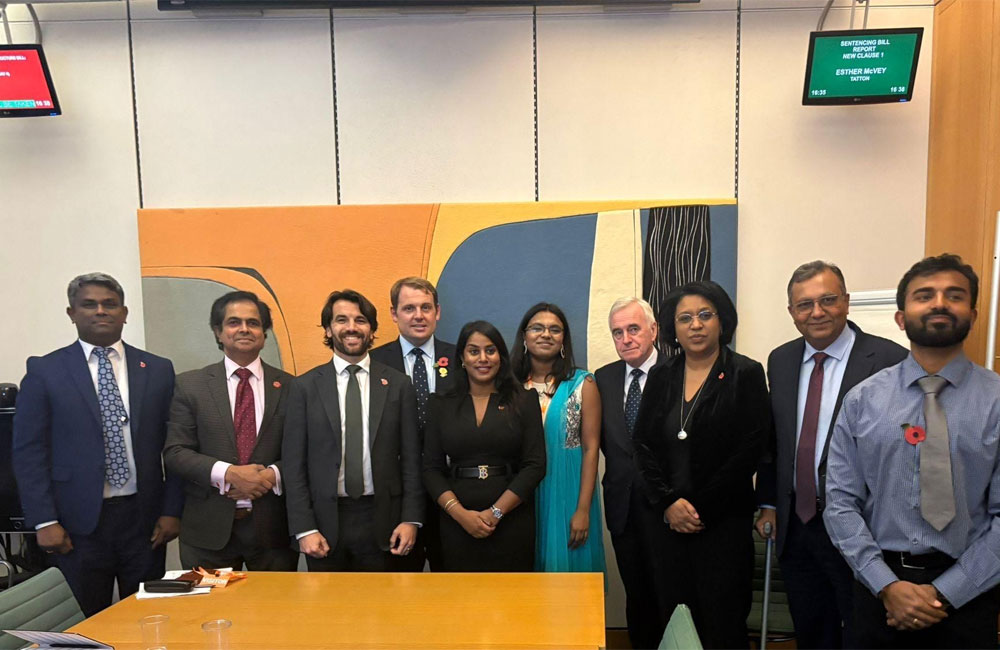
All-Party Parliamentary Group for Tamils (APPG-T) Annual General Meeting 2025
The British Tamils Forum, Secretariat of the All-Party Parliamentary Group for Tamils (APPG-T), is pleased to announce that the Annual General Meeting (AGM) of the APPG-T was held on Tuesday, 29 October 2025, at 4:00 PM in Parliament, with participation from Members of Parliament across parties.
At the meeting:
• Dame Siobhain McDonagh MP was re-elected as Chair of the APPG-T.
• Vice Chairs: Uma Kumaran MP (Labour), Bobby Dean MP (Liberal Democrat), and Louie French MP (Conservative).
Other APPG-T Members present:
• Daniel Francis MP
• Dawn Butler MP
• Janet Daby MP
• Jo White MP
• The Rt Hon John McDonnell MP
• Luke Taylor MP
• Natasha Irons MP
• Dr Neil Hudson MP
Apologies Received from 6 parliamentarians:
-
Catherine West MP
-
The Rt Hon Sir Ed Davey MP
-
Ellie Chowns MP
-
Emily Darlington MP
-
Kerry McCarthy MP
-
The Baroness Verma
The AGM provided a platform for cross-party discussion on key matters concerning accountability, justice, and sustainable peace for Tamils in Sri Lanka. Topics discussed included:
• Regular statements from the APPG-T Executive Committee on Tamil issues.
• The Forensic DNA Databank Project.
• Pathways to the International Court of Justice (ICJ) or other international, independent investigation mechanisms.
• The current NPP Government in Sri Lanka, its political agendas, and the continuing impunity.
• The OSLAP evidence repository at the UN Human Rights Council (UNHRC).
• Advocacy efforts in India.
• Time-bound action plans focusing on reparations, resettlement, and reconstruction in the North-East.
• Preparations for an upcoming Parliamentary debate.
The APPG-T reaffirmed its continued commitment to pursuing justice and accountability, promoting human rights, and supporting long-term peace and development for the Tamil people.
For further information, please contact:
T.Vasikaran
British Tamils Forum (Secretariat, APPG for Tamils)
Mobile: 07943100035

Sri Lanka’s Debt Woes Deepen despite Restructuring Gains
Sri Lanka’s debt burden remains perilous in 2025, casting a shadow over its economic recovery despite significant restructuring gains. By March 2025, the country’s public debt had reached an estimated US$107.5 billion, reflecting the government’s continued dependence on domestic borrowing.
External debt stood at around US$37.2 billion by end-March, trimming only slightly to US$37.1 billion by mid-2025. In the first half of the year alone, the government settled US$1.36 billion in external obligations about 55 percent of the US$2.45 billion due for the year.
Debt servicing continues to exert severe pressure on state finances. From January to June 2025, Sri Lanka paid US$863.6 million in external loan principal and US$495.3 million in interest. Domestically, by April 2025 the government had already spent Rs. 1.5 trillion on debt servicing, including Rs. 796 billion in interest70 percent of which was linked to rupee-denominated debt.
The overall debt-to-GDP ratio is also climbing again, reaching roughly 99.5 percent by June 2025, compared to 99.1 percent at the end of 2024. Central government domestic debt rose to Rs. 19.6 trillion during the period, while foreign currency debt increased to Rs. 11.1 trillion.
Despite the gravity of the situation, Sri Lanka has achieved notable progress on debt restructuring. The IMF’s fourth review of its Extended Fund Facility was completed in July 2025, unlocking further assistance.
IMF data shows external public debt at US$40.2 billion by end-2024, with annual servicing costs projected to decline to around US$2.86 billion in 2025 and to continue easing during 2026–2027.
Yet international analysts warn that risks remain elevated. S&P Global projects government debt to peak around 101 percent of GDP in 2025, largely because some domestic obligations were excluded from restructuring. Interest payments alone are forecast to absorb more than half of government revenue this year, severely limiting fiscal space for reforms or social protection.
President Anura Kumara Dissanayake has stated confidently that Sri Lanka can now service its restructured debt. But doubts persist regarding the consistency of the NPP government’s policy direction. While the government secured an agreement with Japan in March 2025 to restructure roughly US$2.5 billion in loans, negotiations with China and India remain unresolved fueling uncertainty over bilateral relief.
Reconciling the administration’s reform promises with political pressures remains a challenge. The government’s ambition to achieve full debt-servicing capability by 2028 depends heavily on fiscal discipline, strong revenue mobilisation, and strict adherence to IMF-recommended reforms. Any deviation from these commitments risks jeopardising the fragile economic stability Sri Lanka is trying to rebuild.
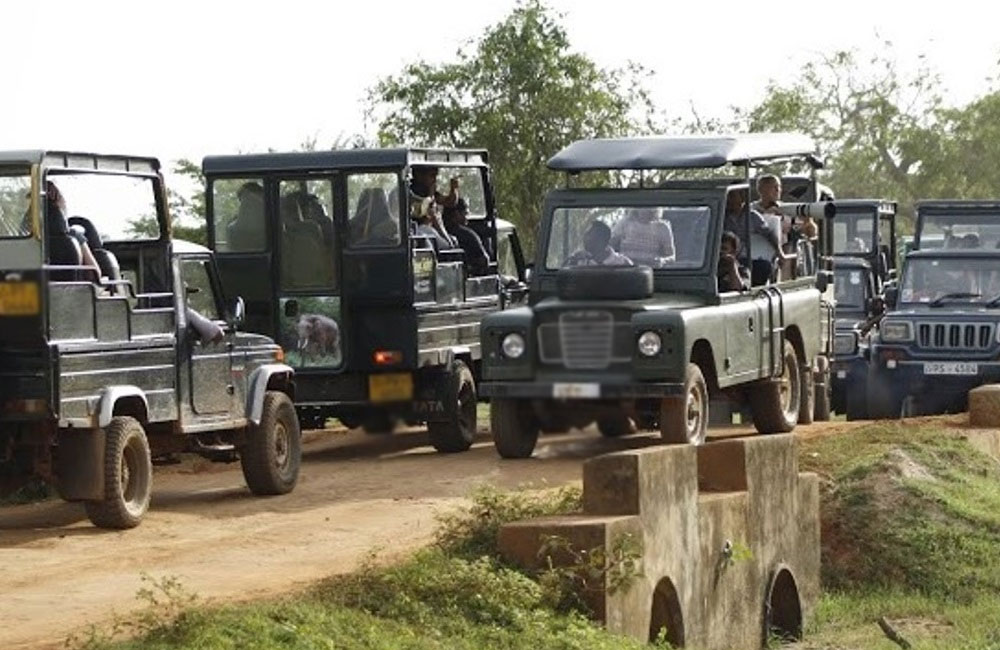
Wildlife Dept Says No to More Jeeps in Yala
The Department of Wildlife Conservation has turned down requests to allow more safari jeeps into Yala National Park, warning that overcrowding is already posing risks to wildlife.
Currently, around 500 jeeps operate inside the park, while operators have sought approval to add 175 more vehicles. Wildlife officials have strongly advised against the proposal, stating that increased vehicle movement would further disturb the animals.
Authorities also noted that approving new entrants would require cutting down the number of existing operators, emphasizing that Yala has already surpassed its sustainable visitor capacity.
Page 57 of 663
